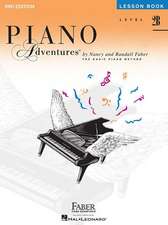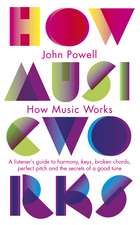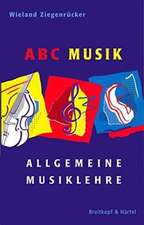Harmonic Materials in Tonal Music, Part I: A Programmed Course
Autor original Paul O. Harder Editat de Greg A Steinkeen Limba Engleză Paperback – 31 ian 2009
Preț: 1112.41 lei
Preț vechi: 1444.70 lei
-23% Nou
Puncte Express: 1669
Preț estimativ în valută:
212.89€ • 219.63$ • 180.18£
212.89€ • 219.63$ • 180.18£
Carte disponibilă
Livrare economică 12-26 februarie
Preluare comenzi: 021 569.72.76
Specificații
ISBN-13: 9780205629718
ISBN-10: 0205629717
Pagini: 390
Dimensiuni: 216 x 274 x 23 mm
Greutate: 0.89 kg
Ediția:10Nouă
Editura: Prentice Hall
Locul publicării:Upper Saddle River, United States
ISBN-10: 0205629717
Pagini: 390
Dimensiuni: 216 x 274 x 23 mm
Greutate: 0.89 kg
Ediția:10Nouă
Editura: Prentice Hall
Locul publicării:Upper Saddle River, United States
Descriere
Created for introductory courses in basic music theory and harmonic practice, this self-paced, auto-instructional text in two volumes has become a “classic” in the field. Since the students work independently through the programmed format of the text, instructors can concentrate on the more creative aspects of their course. From the wealth of clearly laid-out lessons and exercises, students receive continual feedback and reinforcement as they work through the sequence at their own pace. Also, a set of musical examples on compact discs accompanies the volumes, providing students with aural experience of tonal and harmonic material used in the text.
Cuprins
Table of Contents:
Part I:
About the Authors
Preface to the tenth Edition
Preface to the Fifth Edition
How to use this Text
An Important Perspective for the study of Harmony
1. Some Definitions.
2. The Structure of Tonality.
3. Triads in Root Position: Doubling and Spacing.
4. Triads in Root Position: Voice Leading.
5. Triads in First and Second Inversion.
6. Introduction to Seventh Chords and the Dominant Seventh.
7. Phrase Structure and Cadences.
8. Nonharmonic Tones.
9. Harmonic Progression.
10. The Technique of Harmonization.
Appendix A: Chord Symbols.
Appendix B: Piano Styles.
Appendix C: Glossary of Terms.
Appendix D: Orchestration Chart; Note/Octave, MIDI Charts
Bibliography for Further Study.
Index of Musical Examples.
Subject Index.
Part I:
About the Authors
Preface to the tenth Edition
Preface to the Fifth Edition
How to use this Text
An Important Perspective for the study of Harmony
1. Some Definitions.
2. The Structure of Tonality.
3. Triads in Root Position: Doubling and Spacing.
4. Triads in Root Position: Voice Leading.
5. Triads in First and Second Inversion.
6. Introduction to Seventh Chords and the Dominant Seventh.
7. Phrase Structure and Cadences.
8. Nonharmonic Tones.
9. Harmonic Progression.
10. The Technique of Harmonization.
Appendix A: Chord Symbols.
Appendix B: Piano Styles.
Appendix C: Glossary of Terms.
Appendix D: Orchestration Chart; Note/Octave, MIDI Charts
Bibliography for Further Study.
Index of Musical Examples.
Subject Index.
Caracteristici
Provide students with a solid foundation in music theory and harmonic practice:
- Chapter summaries provide succinct encapsulations of key concepts in each chapter and give students the opportunity to review them before moving on.
- “An Important Perspective for the Study of Harmony” prefaces text and gives a solid explanation and rationale for the study of harmony, and gives students a useful overview of the subject.
- Mastery frames, a glossary of terms, and a bibliography make the text completely self-instructional, freeing instructors to use their class time in more creative ways.
- “Mastery Frames” evaluates students' mastery of material and ability to move on to the next chapter
- New online assessment tool titled MyMusicTheoryKit which contains the following materials to reinforce the course material:
· All of the exercises in Harder/Steinke’s three books in a new, flash-card based program for student self-study
· A basic introduction to concepts in Music Theory with self-assessment and drilling exercises
· Streaming audio for the musical examples in these books - Compact Disc recordings of in-text musical examples bring the material to life, and allow students to develop their ear for tonal harmony.
- Coverage of piano styles promotes creative work among students.
Caracteristici noi
Changes to the new edition include:
- New online assessment tool titled MyMusicKit.
- Major changes made in many of the chapters by adding alternative analysis option to suggest a bridge between “traditional analysis” and chord identification systems used in pop, and jazz.
- Refinements in language, vocabulary and definitions throughout the book.
- Changes and additions to some of the supplementary assignments which reflect the alternative analysis approach.
- Greater emphasis to align Basic Tonal Music and Harmonic Material in Tonal Music, Parts I and II as a complete series for music theory courses.
- Updated appendices
- Changes/additions to the Instructor's Manual
Textul de pe ultima copertă
Created for introductory courses in basic music theory and harmonic practice, this self-paced, auto-instructional text in two volumes has become a "classic" in the field. Since the students work independently through the programmed format of the text, instructors can concentrate on the more creative aspects of their course. From the wealth of clearly laid-out lessons and exercises, students receive continual feedback and reinforcement as they work through the sequence at their own pace. Also, a set of musical examples on compact discs accompanies the volumes, providing students with aural experience of tonal and harmonic material used in the text.








